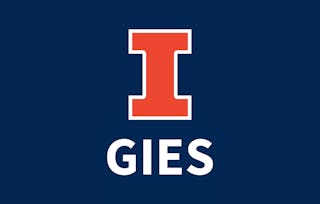This course is part of a Specialization titled “Strategy and Finance for a Lifecycle of a Social Business”, with a follow-on project-based course on understanding and evaluating a business focused on addressing a societal issue. The beauty of a modern decision-making framework is that it can be used to understand value creation at any level – the individual or business or societal. The applications however become increasingly complex as your lens expands from the individual to the corporate/nonprofit to the global society.

Risk, Return and Valuation

Risk, Return and Valuation
Ce cours fait partie de Spécialisation Strategy and Finance for the lifecycle of a Social Business


Instructeurs : Suresh K. Krishna
Inclus avec
10 avis
Expérience recommandée
Ce que vous apprendrez
How to value projects and companies
Compétences que vous acquerrez
- Catégorie : Cost Benefit Analysis
- Catégorie : Portfolio Risk
- Catégorie : Cash Flows
- Catégorie : Business Risk Management
- Catégorie : Risk Analysis
- Catégorie : Portfolio Management
- Catégorie : Decision Making
- Catégorie : Return On Investment
- Catégorie : Capital Budgeting
- Catégorie : Corporate Finance
- Catégorie : Financial Analysis
- Catégorie : Finance
- Catégorie : Business Valuation
- Catégorie : Social Impact
- Catégorie : Environmental Social And Corporate Governance (ESG)
- Catégorie : Risk Management
- Section Compétences masquée. Affichage de 10 compétence(s) sur 16.
Détails à connaître

Ajouter à votre profil LinkedIn
6 devoirs
Découvrez comment les employés des entreprises prestigieuses maîtrisent des compétences recherchées

Élaborez votre expertise du sujet
- Apprenez de nouveaux concepts auprès d'experts du secteur
- Acquérez une compréhension de base d'un sujet ou d'un outil
- Développez des compétences professionnelles avec des projets pratiques
- Obtenez un certificat professionnel partageable

Il y a 6 modules dans ce cours
The Specialization is part of a program designed for an audience interested in working for, or creating, social businesses and anyone who wants to use modern frameworks and tools to understand how value is created for an individual, a company and social business. Since social businesses take on inherently more complex missions - by design, they are set up to address social issues - the task of understanding and evaluating opportunities aimed at addressing social issues requires a deeper understanding of the strengths and weaknesses of modern frameworks and tools. Arguably, all businesses try and impact society. This is the main reason why the Specialization has both analytical rigor and real-world applicability. My hope is that by the end of the Specialization we will be ready to evaluate, understand, and even create social businesses. This is a journey that will start with value to an individual and then gradually understand value created by regular businesses and, finally, tackle value creation by a social business. We will however not wait till the end of the Specialization to start thinking seriously about how social businesses are distinct from regular businesses. The good news is that you have already been exposed to a great course on social business – with world-known experts sharing their views, followed by an engaging and framework-based approach to consider how to identify a social problem and then develop an approach to addressing it using a multi-stakeholder approach. To motivate folks to understand the complexity of evaluating a social business, I will start by sharing some publicly available articles on what popular thinking is about social business, on how to measure social value and some real-world examples. I will do so gradually over the four courses, without testing, but with reflection exercises built in at the beginning and the end of each course. I have managed the Social Venture Fund (SVF) at the University of Michigan for over a decade now and we evaluate and invest in social businesses. I also recently launched the International Investment Fund (IIF) in India that evaluates, supports and invests in small- and medium-sized businesses. I will share cases written by me and my students related to this work, but please do not distribute them. The purpose of the reflection exercises is meant for you to gradually gain exposure to the complexities of social businesses and measuring social value. You are not expected to be able to value the businesses described in the cases, but to keep them in mind and reflect on the frameworks and tools you are introduced to and their applicability to decision-making in social businesses. While you will not be tested on specifics in the reflection portions of this Specialization, maintaining a personal journal on important issues throughout the Specialization will really help so you prepare for the challenging work on the project on a social business following successful completion of the Specialization. You will hopefully realize that the framework and tools provided in the Specialization will not only help you in any business, but also are the same for a social business. You will hopefully realize that, at the end of the day, it is all about intent and what you produce/provide and to whom and how. And what is readily measurable and verifiable may be one of the key differences between a regular and a truly social business – everything, eventually, is about quantity times price of what you have to offer. Most businesses focus on producing goods and services that have readily available markets and therefore prices. Perhaps the key difference in understanding and managing a social business versus a regular business is its focus on issues beyond an individual and a desire to provide goods and services that are not priced and therefore rewarded by free markets because they benefit society and cannot be captured by corporations. This, in turn, makes a social business all the more challenging to create and manage.
Inclus
2 lectures
This module contains detailed videos and syllabi of both the Specialization and the fourth course. This Specialization has been designed to enable you to learn and apply the powerful tools of modern finance to personal, corporate and social businesses. In fact, this frameworks and tools can be applied to decision-making in any context, including nonprofit and governmental initiatives to tackle the simplest to most challenging issues we confront individually or collectively. The courses within progress linearly and build on each other and it is important for you to get an understanding of why this Specialization may be relevant to any context. Please review the videos and syllabi as they will give you a sense of the Specialization and how this specific course fits within. My teaching style and philosophy are also presented to you (hopefully) in sufficient detail. I believe education is the key to addressing the challenges that we face across the globe. Most importantly, all this content is meant to give you enough information to enable you to make a decision about whether you want to take this Specialization, or this course by itself. To make sure you have the social lens in mind, we have also created a course that focuses on social business that you must take before this Specialization. This will hopefully make you think about what a social business looks like and, importantly, how it differs from standard business. A deeper realization of this can only occur when you are able to recognize how value is created by regular businesses. This will be a slow process that is hopefully already in motion and your understanding will deepen by the end of this course so that you are ready to work on a social business.
Inclus
5 vidéos1 lecture
This course deals with the determination of the discount rate we have used in all previous courses to value projects, bonds and stocks. Combined with cash flows, the discount rate captures all aspects of financial valuation that is the main goal of this Specialization and course. In the first module, we will try and understand risk as perceived by humans and develop a measure that is powerful and intuitive. Since this topic requires both art and science of finance, we will have three assignments in this course.
Inclus
8 vidéos4 lectures2 devoirs
During this module, we will introduce one of the most powerful and intuitive model of modern finance - the Capital Asset Pricing Model (CAPM) - that forms the basis of our understanding of the relation between risk and return.
Inclus
8 vidéos1 lecture2 devoirs
In this module, we will understand the discount rate in a world where a company has both equity ad debt. This will require us to evaluate the impact of debt (also known as leverage) on the equity holders of the firm. We will develop the weighted average cost of capital. Finally, we will put together cash flows and WACC and get our first exposure to valuation with a full-blown application.
Inclus
16 vidéos2 lectures
This last module of this course and the Specialization. We therefore wrap things up by providing some real world twists and a final assignment that evaluates your ability to put everything together.
Inclus
1 vidéo3 lectures2 devoirs
Obtenez un certificat professionnel
Ajoutez ce titre à votre profil LinkedIn, à votre curriculum vitae ou à votre CV. Partagez-le sur les médias sociaux et dans votre évaluation des performances.
Instructeurs


Offert par
En savoir plus sur Finance
 Statut : Essai gratuit
Statut : Essai gratuitYunus Social Business Fund Bengaluru
 Statut : Essai gratuit
Statut : Essai gratuitUniversity of Illinois Urbana-Champaign
 Statut : Essai gratuit
Statut : Essai gratuitDuke University
 Statut : Essai gratuit
Statut : Essai gratuitRice University
Pour quelles raisons les étudiants sur Coursera nous choisissent-ils pour leur carrière ?

Felipe M.

Jennifer J.

Larry W.

Chaitanya A.

Ouvrez de nouvelles portes avec Coursera Plus
Accès illimité à 10,000+ cours de niveau international, projets pratiques et programmes de certification prêts à l'emploi - tous inclus dans votre abonnement.
Faites progresser votre carrière avec un diplôme en ligne
Obtenez un diplôme auprès d’universités de renommée mondiale - 100 % en ligne
Rejoignez plus de 3 400 entreprises mondiales qui ont choisi Coursera pour les affaires
Améliorez les compétences de vos employés pour exceller dans l’économie numérique
Foire Aux Questions
You can do this course standalone or as part of the online Specialization.
To access the course materials, assignments and to earn a Certificate, you will need to purchase the Certificate experience when you enroll in a course. You can try a Free Trial instead, or apply for Financial Aid. The course may offer 'Full Course, No Certificate' instead. This option lets you see all course materials, submit required assessments, and get a final grade. This also means that you will not be able to purchase a Certificate experience.
When you enroll in the course, you get access to all of the courses in the Specialization, and you earn a certificate when you complete the work. Your electronic Certificate will be added to your Accomplishments page - from there, you can print your Certificate or add it to your LinkedIn profile.
Plus de questions
Aide financière disponible,

